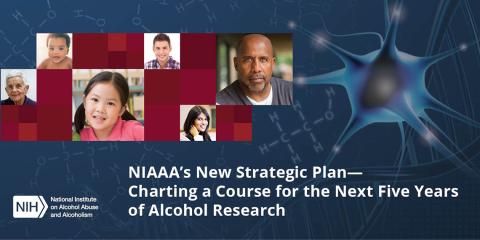NIAAA Charts Research Course with New Strategic Plan

As scientific advances continue to expand our understanding of how alcohol affects human health and point to new ways to address alcohol-related harm, the National Institute on Alcohol Abuse and Alcoholism has released its 2017-2021 strategic plan for research. The new plan serves as a roadmap for optimizing the allocation of NIAAA’s resources to areas of alcohol research most likely to benefit from additional support.
“There has never been a better time to accelerate progress across the spectrum of alcohol research,” said NIAAA director Dr. George Koob. “Our strategic plan builds on recent transformative developments in basic research, prevention, diagnosis and treatment and charts our course for the next 5 years as we seek to address the many public health challenges caused by alcohol misuse and alleviate human suffering.”
Approximately 16 million people in the United States have alcohol use disorder (AUD). An estimated 88,000 people die from alcohol-related causes annually, making alcohol the fourth leading preventable cause of death in the United States. Alcohol is involved in nearly half of all liver disease deaths and prenatal alcohol exposure is a leading preventable cause of birth defects. Alcohol problems cost the U.S. $249 billion each year.
For nearly five decades, NIAAA has conducted and supported an integrated and multidisciplinary program of cutting-edge research to reduce the toll that alcohol misuse takes on human health and well-being. This work has significantly broadened our understanding of the factors that contribute to alcohol-related problems and the mechanisms by which they develop.
Once viewed as a moral failing or character flaw, AUD is now widely recognized as a chronic brain disease with potential for recovery and recurrence. This shift in perspective, supported by advances in neurobiological research, has helped reduce the stigma associated with AUD, led to more effective prevention and treatment, provided support for integrating prevention and treatment services into mainstream health care and helped countless individuals afflicted with alcohol use disorders live productive, healthy lives post-treatment.
The NIAAA strategic plan was developed with input from NIAAA’s advisory council, the broader research community and the public. The new plan is available at https://www.niaaa.nih.gov/strategic-plan.
